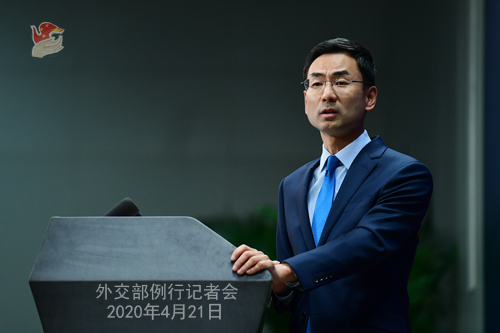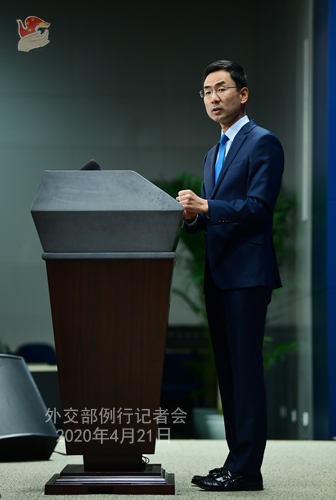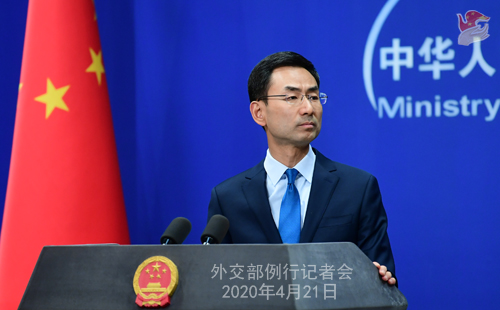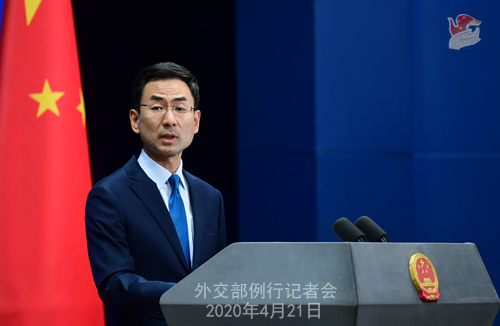| Foreign Ministry Spokesperson Geng Shuang's Regular Press Conference on April 21, 2020 |
| 2020-04-21 19:36 |
|
The Paper: Wuhan and Los Angeles just held a video conference this morning to discuss reopening cities and resuming work and production. Can you talk more about it? Geng Shuang: Indeed, this morning Wuhan and Los Angeles held a video conference to discuss reopening the city and resuming work and production after the virus is effectively contained. Thorough talks between principal officials of both municipal governments and other areas lasted almost two hours and yielded good results. In the meantime, presidents of Wuhan University and Ohio State University also held a video conference to discuss campus management during the pandemic. Thanks to the arduous efforts, Wuhan, a heroic city, is walking out of the shadow of the epidemic. It recently lifted the lockdown for people to freely leave Wuhan and Hubei, the epidemic risk there is at a low level, and production and life is gradually brought back onto the right track. For a while, Chinese localities including Wuhan and medical institutions have been sharing COVID-19 experience and treatment solutions via video conference and other channels with their American counterparts upon request. They have been donating medical supplies to US states, cities, institutions and enterprises, and facilitating US procurement of anti-epidemic items in China. We would like to continue sharing all our information and experience with the US side, and support them to the best of our capacity, so that they can defeat the virus and resume normal life as soon as possible. It will also be China's contribution to the global fight against COVID-19 and to an early world economic recovery. CNN: The US is reportedly monitoring intelligence on post-surgery health conditions of DPRK's leader Kim Jong Un. Does the Chinese side have more information on this? Do you have a comment? Geng Shuang: I did read some media reports on this, but I'm not sure of their source. Could what you mentioned be it? China and the DPRK are friendly neighbors linked by mountains and rivers. We stand ready to work with the DPRK to continuously move forward bilateral relations.
China Daily: On March 30, Vietnam's Permanent Mission to the UN sent a diplomatic note to the UN, reiterating its sovereignty over Xisha and Nansha Islands. We have learned that on April 17, China's Permanent Mission to the UN sent a diplomatic note to the UN Secretary-General expressing objection to Vietnam's position. Can you confirm this and offer a comment? Geng Shuang: From the end of March this year, Vietnam's Permanent Mission to the UN has sent several diplomatic notes to the UN Secretary-General, asserting its illegal claim over the South China Sea and attempting to negate China's sovereignty, rights and interests over these waters. China firmly objects and has lodged solemn representations with the Vietnamese side. On April 17, China's Permanent Mission to the UN was instructed to send a diplomatic note to the UN Secretary-General reiterating China's solemn position and expressing objection to Vietnam's illegal claim and erroneous view. Xisha Islands and Nansha Islands are China's inherent territory. China has sovereign rights and jurisdiction over relevant waters of the South China Sea in accordance with relevant international law including UNCLOS. China also has historical rights in the South China Sea. I want to stress this: attempts by any country to negate in any means China's sovereignty, rights and interests in the South China Sea and to reinforce its own illegal claim are bound to be fruitless. We will take all measures necessary to resolutely safeguard our sovereignty, rights and interests in the South China Sea. Xinhua News Agency: The team of experts sent by the Chinese government to the Philippines came back to China on April 19. Can you give us more details on their work there and what else China has done to support the Philippines? Geng Shuang: The medical team sent by the Chinese government was organized by the National Health Commission and consisted of experts selected by Fujian Provincial Health Commission. In the past two weeks or so, they assisted the Philippines in fighting COVID-19, visited multiple medical institutions, and held dozens of consulting seminars and lectures to share know-how and experience. Their work have demonstrated the friendship and mutual assistance between China and the Philippines. The Philippine government and people lauded the medical experts as envoys from China and heroes against the virus. The Philippines and China are friendly, close neighbors. Faced with COVID-19, China donated batches of urgently-needed medical supplies to the Philippines through various channels and made efforts to facilitate its procurement in China and the timely delivery of its purchase. The Philippine President, health secretary, foreign secretary and other senior officials expressed appreciation and gratitude for China on various occasions, saying that China's assistance provides the Philippines with a lifeline. China has been closely following the situation in ASEAN countries and has dispatched five medical teams to support their response. The teams to Cambodia, Laos and the Philippines have concluded their mission, and the teams to Myanmar and Malaysia are carrying out intensive work on the ground. The Special ASEAN Plus Three Summit on COVID-19 held last week injected new impetus into regional cooperation in fighting the virus. Upholding the vision of a community with a shared future for mankind, we will implement the outcomes of this special summit and continue doing our best to share experience, provide material and technical support, jointly improve capabilities in epidemic response and safeguard the life and health of all people in the region.
Reuters: According to a report from the Wall Street Journal, China is in talks with several countries to discuss easing border controls and putting in place fast tracks for travelers. Can you confirm if this is the case and if so, give more details on what's being proposed? Geng Shuang: China is discussing with relevant countries fast track arrangement for urgent essential travels including for business and technical purposes. The aim is to stabilize important economic and trade cooperation while guaranteeing epidemic prevention and control, and to ensure safe and smooth operation of the international industrial and supply chains. Chinese Vice Foreign Minister Le Yucheng and ROK First Vice Foreign Minister Cho Sei Young reached a principled agreement on establishing a fast track between the two countries during a recent video conference. Officials on the two sides are in consultations to work out a detailed plan for implementation. During the virtual China-Singapore Joint Meeting on COVID-19 co-chaired by Chinese Vice Foreign Minister Luo Zhaohui and Permanent Secretary of Singapore's Ministry of Foreign Affairs Chee Wee Kiong, the two sides also agreed to explore ways to facilitate necessary travels while ensuring public health security. CNR: Japanese Prime Minister Shinzo Abe and several members of his Cabinet sent ritual offerings to the Yasukuni Shrine where convicted World War II class-A war criminals are honored. What is your response? Geng Shuang: China's position on the issue of the Yasukuni Shrine is clear and consistent. As you pointed out in your question, these negative moves on the Japanese side reflect its wrong attitude towards its past history of aggression. We urge the Japanese side to honor the pledges and commitments they've made and gain the trust of its Asian neighbors and the international community with concrete actions. AFP: My first question is regarding German Chancellor Angela Merkel who has urged China to be as transparent as possible about the coronavirus outbreak. She said the more transparent China is about the origin of the virus, the better it is for everyone in the world to learn from it. What is China's view on this? Has China made further progress in the study about the virus' origin? My second question is about the US calling for lifting restrictions on the movement of lawyer Wang Quanzhang and urging the release of other rights advocates who have been detained. Does China have any comment on this matter as well? Geng Shuang: On your first question, China has all along been advancing international anti-pandemic cooperation in an open, transparent and responsible attitude. Since the outbreak of COVID-19, we have been in close communication and exchange with the German side to share experience and conducted fruitful cooperation with the German side. With regard to the origin of the virus, we've repeatedly stated that it's a matter of science that should be researched by scientists and professionals. On your second question, China is a country with rule of law. Chinese judicial organs handle cases in accordance with law. We firmly object to interference in our domestic affairs and judicial sovereignty by any country or organization under any pretext.
Beijing Youth Daily: A latest study showed that China's hydroelectric dams on the upper Mekong exacerbated the drought in downstream countries. On April 15, the Mekong River Commission (MRC) said the study did not prove that the withholding of water caused the drought. "The MRC has attempted to acquire dry season data from China, but no agreement has yet been reached." Could you confirm this and offer a comment? Geng Shuang: I believe the study you mentioned was published in the New York Times on April 13. The groundless report runs counter to facts. The MRC Secretariat already made a science-based assessment on this drought based on its weekly flood situation reports for a while. Since May 2019, vast areas of the Lancang-Mekong region experienced sustained dry conditions and lack of rainfall, with major hydrological stations recording 20 percent to 50 percent less average monthly rainfall from June to October compared to the multi-year average. Reduced precipitation and abnormality in the monsoon combined with an extreme El Niño event became the main cause of this drought. The runoff of Lancang only accounts for 13.5 percent of the total of the Lancang-Mekong river. The outflow from Lancang has a very limited impact on the overall volume of the Mekong as runoff in the lower reaches mainly depends on precipitation and contributions from branch rivers. Therefore there is no reason justifying the claim that China is responsible for the drought in downstream countries. China's Yunnan province has also been suffering from a severe drought since last year. Despite this, China has been doing its best to guarantee reasonable discharge volumes downstream. In the fifth Lancang-Mekong Cooperation (LMC) foreign ministers' meeting in February this year, State Councilor and Foreign Minister Wang Yi announced the decision to positively consider sharing year-round hydrological data with Mekong countries and enhance cooperation under the LMC framework to ensure reasonable and sustainable use of water resources. China's measures fully demonstrate its sense of responsibility as an upstream country. The Lancang-Mekong region is home to the six riparian countries, thus cooperation in water resources should naturally be led by these regional countries. There are existing mature communication mechanisms where the parties deal with relevant matters with sincerity, mutual understanding, mutual accommodation and joint consultation. China will step up information-sharing and cooperation in water resources with Mekong countries and work with them to address challenges brought by climate change, floods and other natural disasters. TASS: My question is about the UN Security Council permanent member summit. Does China have any information on when and how this summit will take place and can it be held in a video conference format? Geng Shuang: As COVID-19 continues to spread across the globe, China holds a positive attitude towards any proposal conducive to strengthening international solidarity and cooperation in this joint fight. With regard to holding a meeting including through video link of the five permanent members of the UN Security Council, China stands ready to stay in communication with other permanent members.
Shenzhen TV: "G77 and China" issued a statement on April 19, expressing appreciation to WHO for its leadership in combating COVID-19. However, we have also noted that the US has repeatedly criticized the work of WHO and announced a suspension of contributions to it. What is China's comment? Geng Shuang: "G77 and China" is an important international coordination mechanism for developing countries to seek strength through unity. As COVID-19 is spreading around the globe, "G77 and China" made a point by issuing a statement to approve and support WHO's leading role in fighting the pandemic under the leadership of Director-General Tedros and call on the international community to strengthen support for developing countries, which reflects the common position and collective appeal of developing countries. This is significant to deepening multilateral cooperation and making a collective response to the pandemic, which deserves high attention from all parties. In fact, besides "G77 and China", many countries like France, Germany, the UK, Canada, Japan as well as international organizations and institutions like the UN and the EU have all expressed their support for WHO in continuing to play an important role in responding to the current pandemic and strengthening the global public health system. As for what the US has said and done recently to hurt WHO, China has made its position clear. Here I would like to stress a few points. The US believes that WHO should do its bidding because it is the largest contributor. This is typical hegemonic mentality. When WHO insisted on objectivity and impartiality and refused to cater, the US threatened it by cutting funding. This is classic blackmailing. The US attacked and badmouthed WHO without factual basis, and its coercion is just repulsive. Over the weekend, WHO and celebrities around the world jointly launched the "One World: Together at Home" charity concert to raise funds for medical workers fighting on the front line and to bolster morale in this global fight. The event received enormous attention and positive responses, which is also reflective of the public opinion of the international community. We hope that the US side will heed the shared wish of the international community to enhance solidarity and coordination and support WHO and not stand on the opposite side of the international community. China has always firmly supported WHO in playing a leading role in promoting global public health, and is ready to increase such support through various channels. At this crucial moment in the global fight against the pandemic, to support WHO is to uphold the status and role of the UN, champion the vision and principles of multilateralism, and maintain the unity and cooperation of the international community. This is paramount to secure the final victory against the pandemic. Reuters: Two US warships are operating in the South China Sea and sources have told Reuters they were near an area of a standoff between a Chinese survey ship and a Malaysian exploration vessel operated by the state oil company. Do you have any comment on the US ships' presence? And secondly, has China asked the Malaysian vessel to leave this area? Geng Shuang: Regarding your first question, I'm not aware of the circumstances. I would just like to state that currently the situation in the South China Sea is steadily improving. We hope countries outside the region will respect regional countries' efforts and refrain from making waves. On second question, to my knowledge, the Chinese survey ship is conducting normal activities in waters under Chinese jurisdiction. There was no such "standoff" as you mentioned. Currently situation in the South China Sea is basically stable. Relevant parties should exercise self-restraint and avoid taking actions complicating the situation or escalating disputes. PTI: You said China is in talks with relevant countries for fast track arrangement. You mentioned South Korea and Singapore. Are there any other countries you can name, including India for that matter? Geng Shuang: With regard to the fast track arrangement, I have no further updates at the moment beyond the ROK and Singapore.
|
| |||||||||||||||||






